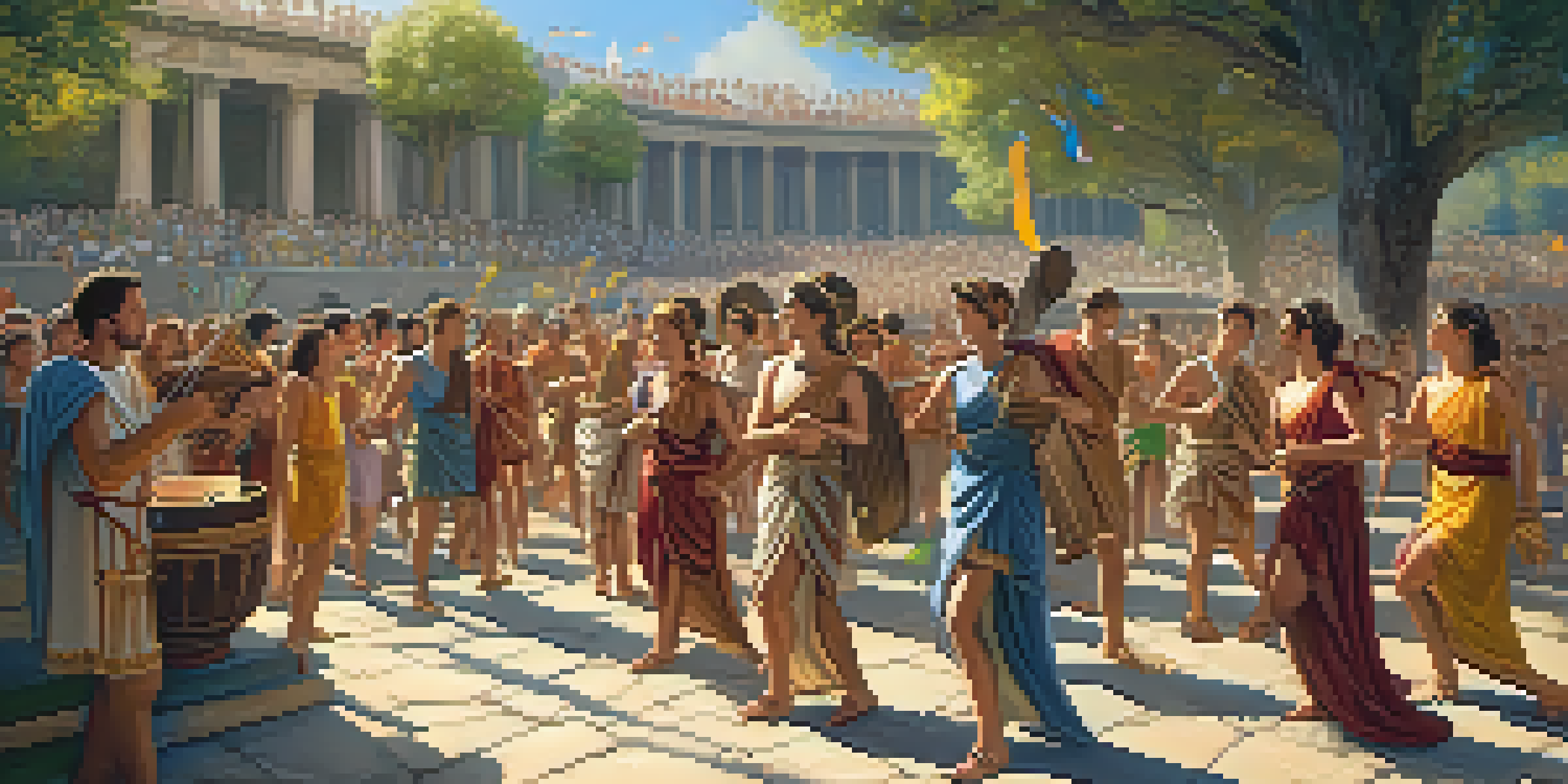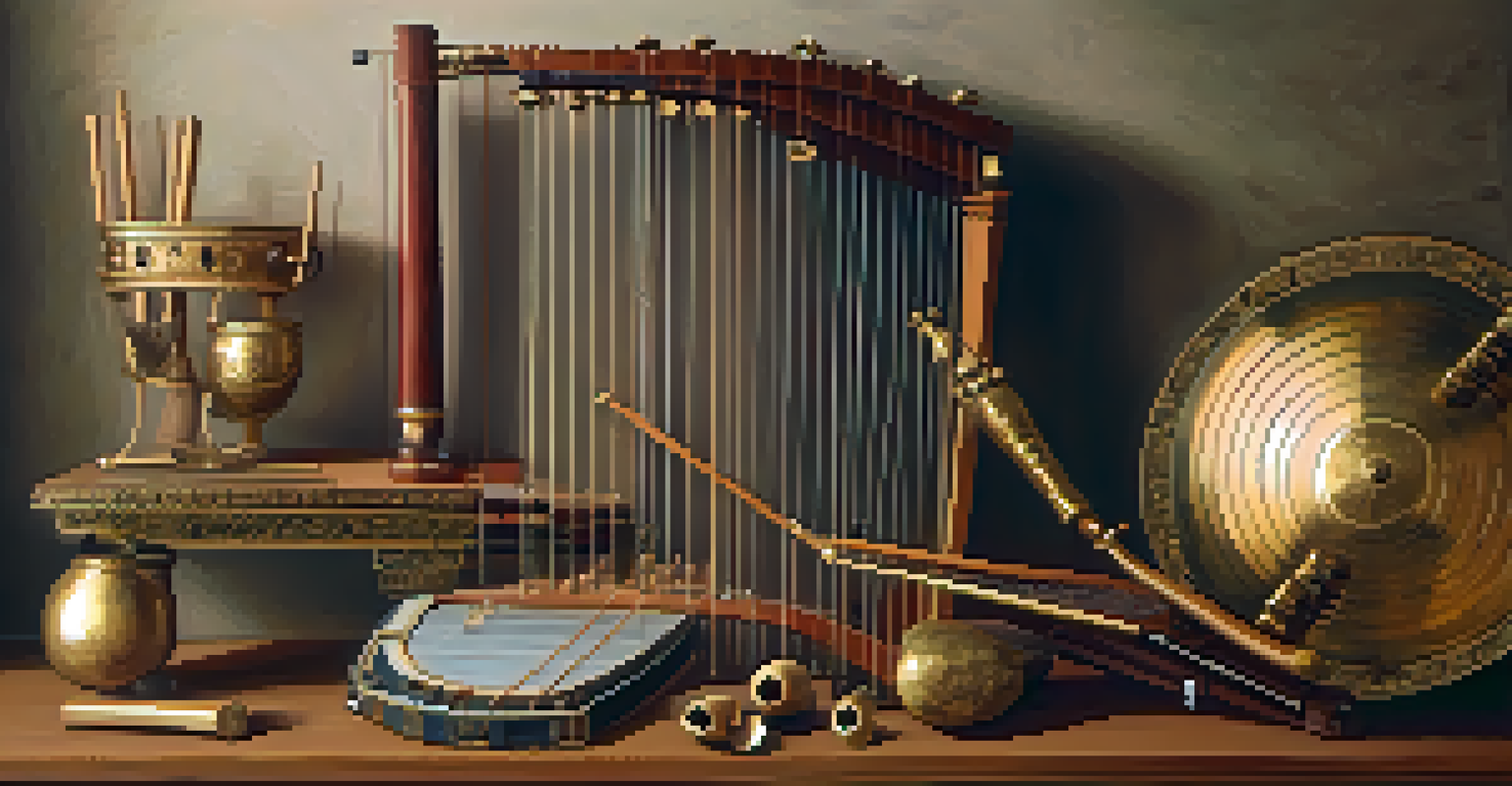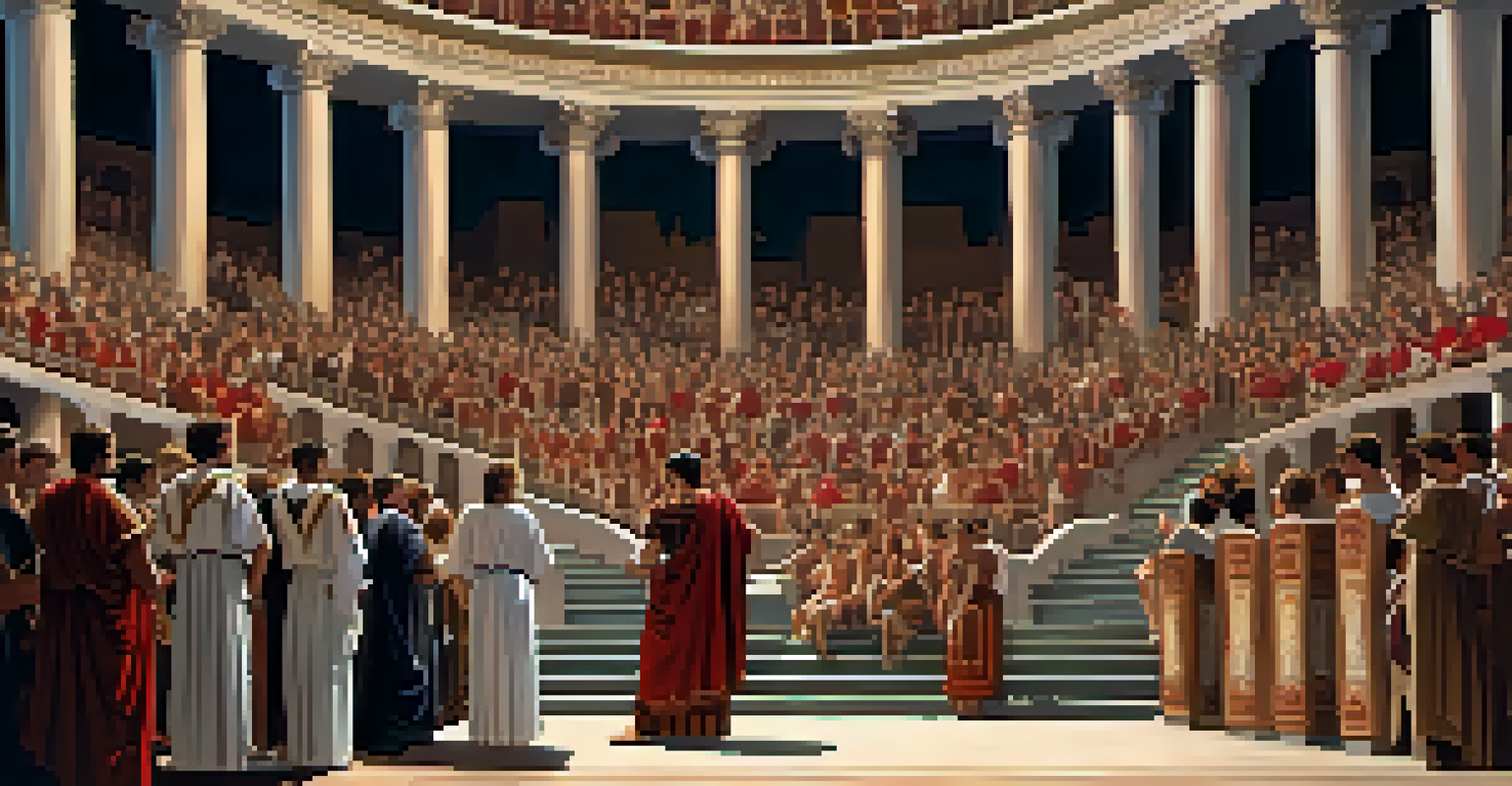Roman Music: Influences and Innovations in the Ancient World

The Role of Music in Ancient Roman Society
Music played a vital role in ancient Roman society, influencing various aspects of daily life. From religious ceremonies to public festivities, music was an integral part of the cultural fabric. Romans believed that music could evoke emotions and connect people, making it essential for both entertainment and social cohesion.
Music is the shorthand of emotion.
In addition to its entertainment value, music was often used in military contexts, inspiring soldiers and boosting morale during battles. The Romans recognized the power of music to foster unity and determination among troops, often employing musicians to lead their armies into combat. This dual role of music as both art and instrument of motivation highlights its significance in Roman life.
Furthermore, music was also an educational tool, with many Romans learning to play instruments and sing as part of their upbringing. This emphasis on musical training helped cultivate a rich musical culture that would influence generations to come, setting the stage for future innovations in music.
Instruments that Shaped Roman Music
The Romans had a diverse array of musical instruments that enriched their musical landscape. Common instruments included the lyre, a stringed instrument similar to a harp, and the tibia, a type of flute made from wood or bone. These instruments not only produced beautiful sounds but also reflected the artistic craftsmanship of the time.

Percussion instruments, such as the cymbals and drums, were also popular in Roman music. These instruments were often used in celebrations and military settings, providing a rhythmic backbone that energized the atmosphere. The combination of string, wind, and percussion instruments allowed for a wide range of musical styles and performances.
Music's Role in Roman Society
Music was integral to Roman life, influencing religious, military, and social practices.
Moreover, the Romans were influenced by the musical instruments of the cultures they encountered, such as the Greeks and Etruscans. This cultural exchange led to the adaptation and evolution of existing instruments, creating a unique Roman sound that incorporated elements from various traditions.
The Influence of Greek Music on Roman Compositions
Greek music had a profound impact on Roman musical practices, inspiring composers and musicians alike. The Romans admired Greek culture and sought to emulate its artistic achievements, particularly in the field of music. This admiration led to the incorporation of Greek scales, rhythms, and styles into Roman compositions.
Without music, life would be a mistake.
One notable aspect of Greek music that influenced the Romans was the use of modes—different scales that evoke various emotions. The Romans adopted these modes, which allowed them to create music that could range from joyous to somber, effectively expressing the complexities of human experience. This practice laid the foundation for the emotional depth found in later Western music.
Additionally, Greek theatrical music heavily influenced Roman performances. Theatrical productions often combined music with drama, resulting in a rich auditory experience that captivated audiences. This blend of music and storytelling would resonate throughout history, shaping the development of opera and musical theater.
Religious Music and its Sacred Significance
In ancient Rome, music held significant religious importance, often accompanying rituals and ceremonies. Sacred music was used to honor the gods, with hymns and chants played during sacrifices and festivals. This connection between music and spirituality emphasized the belief that music could invoke divine presence and favor.
The Vestal Virgins, priestesses of Vesta, were known to perform sacred music in temples, demonstrating the close ties between religion and music. Their performances were believed to ensure the safety of Rome and its citizens, showcasing the importance of musical offerings in maintaining societal harmony. This highlights how music served as a medium for communication between humans and the divine.
Instruments Shaped Roman Music
A variety of instruments, including the lyre and tibia, enriched the musical landscape of ancient Rome.
Moreover, the Romans incorporated music from conquered cultures into their religious practices, creating a rich tapestry of sounds that reflected their diverse empire. This blending of musical traditions not only enriched Roman religious ceremonies but also illustrated the broader cultural influences at play in ancient Rome.
The Impact of Roman Music on Later Cultures
The innovations and practices of Roman music laid the groundwork for many aspects of Western music that followed. As the Roman Empire expanded, so did its musical traditions, influencing regions across Europe and beyond. This diffusion of musical ideas helped shape the cultural landscape of the Middle Ages and the Renaissance.
One of the most significant impacts was the preservation of musical notation. The Romans developed early forms of notation that captured musical ideas, which were later refined by medieval scholars. This system of writing music allowed for the transmission of compositions across generations, ensuring that Roman musical heritage would not be lost to time.
Additionally, the concept of music as an educational discipline took root during the Roman era. The importance placed on musical training influenced the development of music education in later cultures, establishing a foundation for the formal study of music that persists today. This legacy is a testament to the enduring influence of Roman music on subsequent generations.
The Integration of Music into Roman Entertainment
Music was a central feature of Roman entertainment, enriching various forms of public spectacles. From gladiatorial games to theatrical performances, music heightened the emotional impact of these events, drawing audiences into the experience. The combination of visual and auditory stimuli created a vibrant atmosphere that captivated spectators and enhanced their enjoyment.
The Roman theater, in particular, was a hub for musical innovation. Performers often integrated music into their plays, using it to underscore dramatic moments and evoke emotions. This practice not only entertained audiences but also elevated the status of music within the performing arts, paving the way for future developments in drama and opera.
Legacy of Roman Music
The innovations of Roman music laid the groundwork for Western musical traditions and education.
Moreover, music was an essential element of banquets and social gatherings, where it served to entertain guests and create a festive ambiance. Musicians would perform lively tunes, allowing attendees to relax and enjoy the moment. This social aspect of music reinforced its role in fostering community and connection among Romans.
Preservation and Rediscovery of Roman Music
Despite the passage of time, aspects of Roman music have been preserved and studied by modern scholars. Archaeological discoveries, such as ancient instruments and written texts, provide insights into the musical practices of the Romans. These findings allow us to piece together the sounds and styles that characterized Roman music, offering a glimpse into their vibrant cultural life.
In recent years, there has been a resurgence of interest in ancient Roman music, with musicians and historians working to recreate and perform these lost sounds. By using replicas of ancient instruments and researching historical techniques, modern artists strive to bring Roman music to life for contemporary audiences. This revival not only honors the past but also enriches our understanding of music's evolution.

Additionally, the integration of Roman music into educational curricula highlights the importance of preserving cultural heritage. By teaching students about Roman music and its influences, we can foster an appreciation for the richness of ancient traditions and their relevance in today's world.